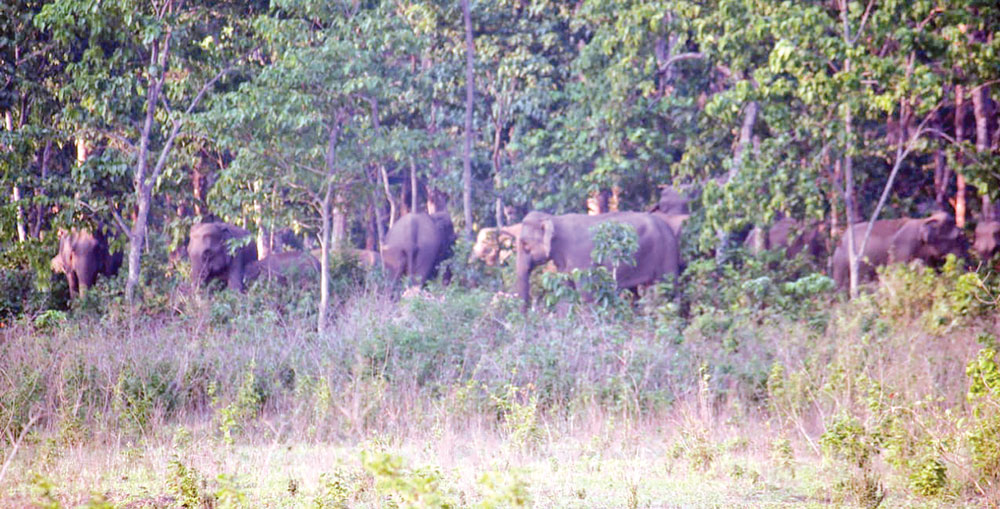Damak, Dec. 21: People in Jhapa and Morang districts in Koshi Province have been unable to sleep at night as the wild elephants, which have entered Nepal from India, have prolonged their stay in local forests. Herds of elephants are noticed almost every day not only in Jhapa but also in Morang and Sunsari districts.
In the past, the elephants used to come to Nepal from India, stay here for a while and return to India. But this time, they are found prolonging their stay. They have been living in various forests across eastern Nepal, such as the Jalthal forest in Jhapa, Charaali forest and the Humsedumse community forest in Damak. The forests of Jhapa, in particular, have become a haven for them.
According to Meghraj Rai, the head of the Division Forest Office in Jhapa, the recurrent problem of wild elephants is due to insufficient attention during the formulation of policies and programmes. He said that the problem was escalating every year. He suggested implementing agricultural programmes in the areas affected by elephants.
The primary reason for elephants migrating to and residing in Nepal is attributed to their search for food.
“Despite Jhapa being an elephant-affected district, it continues to produce corn by designating it as a corn zone. Elephants are fond of maize corn, and they come and stay here to enjoy the corn,” Rai said.
According to Rai, even though there are no thick forests in Jhapa, elephants frequent the district and the availability of corn, a preferred food source for them, is what motivates the elephants to come here, he added.
“They arrive in Nepal due to a scarcity of food in India, and upon finding a year-round food supply in Nepal, they choose to stay here. In the regions affected by elephants in India, tea and pepper are grown commercially, which are not consumed by elephants,” Rai informed.
The issue began to surface due to insufficient attention to the construction of elephant-friendly structures. The importance of promoting coexistence between humans and elephants through the development of structures that are considerate of elephants. “We are planning essential consultations and programmes with relevant authorities to address this issue,” he added.
Jeevan Pathak, a Forester at the Division Forest Office, said that Jhapa could barely provide enough food to sustain four to five elephants.
Their recent efforts have been focused on planting more vegetation in the forest. The elephants venture out when they do not find sufficient food in the forest, leading to the current situation, he said.
Acting Chief of the Agricultural Knowledge Centre in Jhapa, Sagar Bista said that the elephants have been causing great damage to rice and corn yearly. He said it was not practical and scientific to reduce their cultivation when Jhapa is known only for rice and maize. Elephants can be lured by planting fruits in the forest, but it is not practical to reduce rice and corn cultivation in the area, said Bista.
Shankar C Luitel, a specialist in human-elephant conflict management, said that the elephants are lingering in the area due to their preference for the taste of potatoes and sugarcane. They have started living in the forest during the day and enter the human settlements and farms at night.
Meanwhile, an old man died in an elephant attack in Jhapa on Wednesday. According to District Police Office Jhapa, Pathal Rajbansi, 60, of Haldibari Rural Municipality, died in the attack.
The search for Pathal began after he went missing on Wednesday morning. Shukh Lal Rajbansi, Chairman of Ward No. 2 of the rural municipality, said that Pathal, employed as an Office Assistant in the rural municipality, did not come to the office. Concerned about his whereabouts, Rajbansi, along with the police, initiated a search. The police were alerted by locals upon discovering Pathal’s body in Haldibari forest.
Police reported that Pathal, who left his house in the morning, was discovered dead in the jungle near his residence. Locals said that elephants have been sighted in the Haldibari forest over the past few days. Pathal was the sixth person killed by elephants in Jhapa in the last five months.



COMMENTS